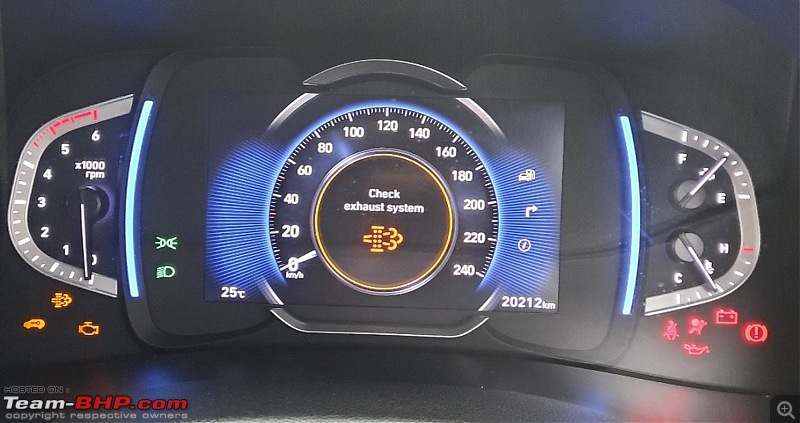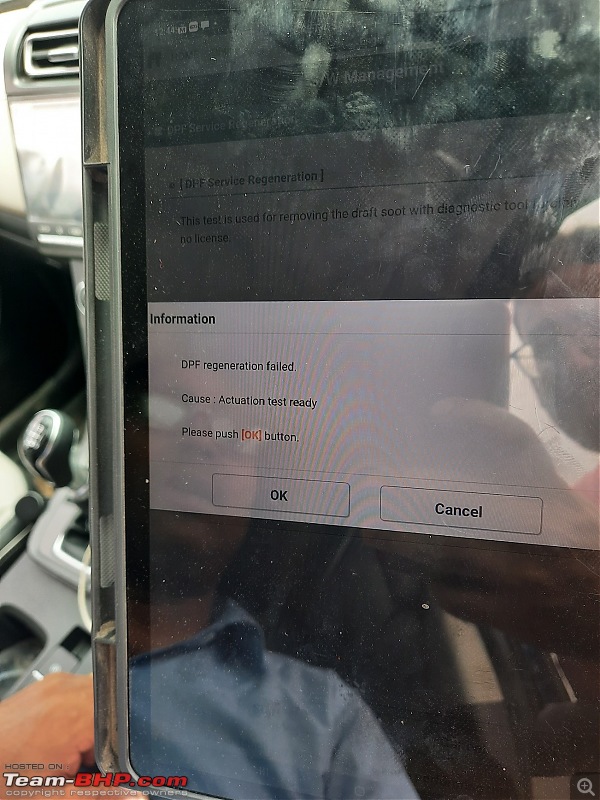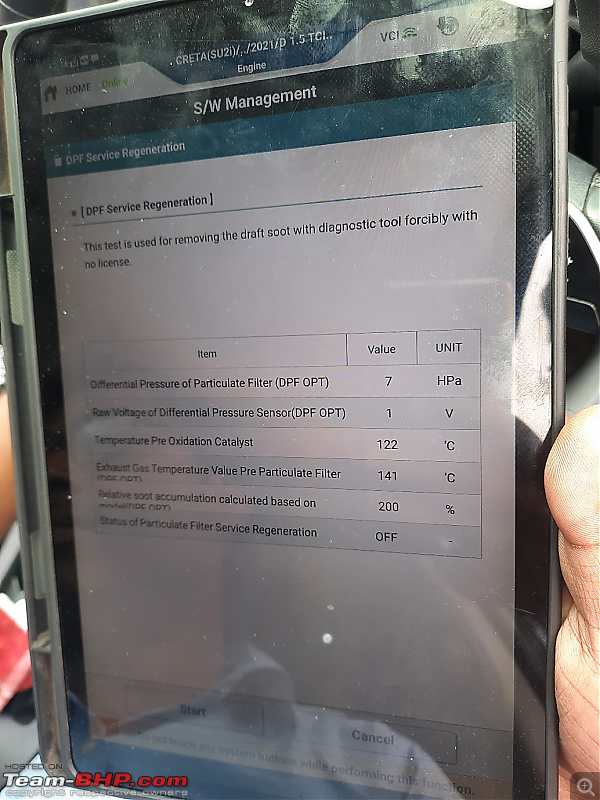My Second and a first diesel Car – Experiences with BS6 DPF

Hi,
Thank you Team-Bhp for accepting me as a member. A Big salute to all automobile enthusiasts here on this forum and also reading this post.
Let me take you along with the journey I had with my Galaxy Blue Creta SXO 1.5 Diesel Manual. As the caption suggests this is my second car after my Breeze Blue Wagon R Vxi (K Series-2012 model) which served us for 9.5 years (60k KMS).
Our Galaxy Blue Creta (color option no longer available) was delivered to us on March 6, 2021 which I had booked in November 2020. The car has clocked 36,000 kms as on June 2023 (2 Years 3 months since purchase of car).
I am sharing my experience with DPF (Diesel Particulate Filter) issues I have encountered so far. It does not mean that there are no positives/ good experiences with this awesome car, a disclaimer here.
1st encounter;
7710 kms on December 23, 2021
The car threw a DPF warning symbol and check engine light started blinking. Immediately contacted the SA at Arsh Hyundai, Mumbai in the morning. The car was picked from my office in the afternoon and was delivered to me next day morning. It was informed to me that they had cleared the error. That is all I could hear from the SA. This was my first experience, and I came to know later that the symbol apart from check engine light which was glowing was actually a DPF warning which I did not recognize initially. However, there was no warning on the instrument cluster regarding Regen process. Later I came to know that the Regen indicator pops up only when the engine has reached an optimum operating temperature.
Till 7710 kms the car had done multiple trips breaks on Mumbai-Bengaluru Highway with good speeds of 110+ and some heavy throttle inputs to zip through while overtaking.
 2nd encounter;
2nd encounter;
19520 km on July 16, 2022
The car threw a DPF and hazard warning symbol and check engine light started blinking (after a while the DPF warning disappeared). After driving the car for a few kms, the instrument cluster displayed the message “Diesel Filter Regeneration required. See owner’s manual”.
After some trial and error, managed to initiate the Regen process. A timer started on the instrument cluster (count down from 28 min) and the engine revved up and stayed at 2100 rpm for around 30 minutes and the process ended after that. During this process, I had opened the bonnet lid of the car as a precaution against overheating, but the manual does not have a mention about it.
After the Regen process, I used the car for two weeks for short trips (<8 Kms per day). Voila, the DPF warning symbol appears again. I deliberately ignored this warning as I had done Regen recently and a trip to Pune was due after two days. Drove the car for short runs <10km a day for couple of days with DPF warning blinking. During my trip to Pune, I drove the car changing gears at a little above 2500 rpm. Till Khalapur toll plaza, I did some speeds at 80-90 kmph in fourth gear (RPM around 3000) for a good stretch (approx. 30 KM). After this experiment, I concluded that I have to drive the car at some good RPM consistently to burn the soot accumulated in DPF whenever possible.
3rd encounter;
After the Pune trip, my daily use was restricted to just under 8 KM per day for two weeks. The DPF Hide & Seek game was ON again. DPF waning flashed and came to life.
Decided, I shall repeat the same strategy (long drive). But here I drove the car clocking single digit KMS each day for a week. After a week of DPF warning and short drives, took the car to Malshej Ghat. This time I was wrong with my hypothesis. I could not do good speeds on the stretch because of the broken roads. The DPF warning was tirelessly flashing and did not budge at all. When I was just about to reach Malshej ghat my instrument cluster popped a warning Check Exhaust System and also engine check light started blinking.

Called my SA at Sharayu Hyundai, Turbhe and I was told that I can drive the car with such warning (I knew the advice tendered was wrong here) and I did the same. While returning I noticed a weird behavior wrt RPM. The car would not accelerate beyond 3000 RPM in any gear. I could feel the power drop at 2800 RPM. I felt like I was driving a vehicle equipped with a clogged carburetor. The more you tried to accelerate, the more it gave up. So, I drove sedately not to stress the engine and reached Navi Mumbai without any hiccups.
Next day was a Sunday, took the car to Showroom. The head of service advisors was giving excuses to attend the car and was suggesting that I leave my car and collect it the next day. On my insistence and my affirmative stance that I had taken an appointment on previous day, he did budge to assign a SA. Later I came to know that the garage had only 3 scanners out of which 2 were not functional.


The car was taken for diagnosis. Mr Dharmendra took the car to the open yard and the diagnostic tool was hooked to scan. He had to reset the system to initiate a forced Regen process.
The process was started and it was almost similar to Manual Regen process which I had done earlier. But here the instrument cluster did not show any timer. The tablet indicated few parameters with readings as given in images. As the forced Regen progressed, the exhaust gas temperature increased and reached a max of 635 degree centigrade and the soot load decreased from 200% to 0%. With my limited knowledge I am unable to comment on the parameters. Let the pictures do the talking here.







 4th Encounter;
4th Encounter;
At 29200 km odometer reading. After a Mumbai-Sirsi-Bengaluru-Tirumala-Bengaluru-Horanadu-Sirsi- Mumbai trip of around 3500 Kms, I did an exclusive city drive of 90 kms (<10 km drive each time) for 2 weeks after the trip. I wanted to see at what interval DPF indicator flashes again. The 90 km drive was consciously driven sedately without any heavy throttle inputs, less idling time (engine tuned off immediately when not required). Just after driving 90 km the DPF warning came. To burn the soot this time I drove the vehicle on JNPT Road from CBD Belapur on 4th gear in speeds around 60 to 80 kmph constantly. This stretch relatively has less traffic and no speed breakers. The DPF warning disappeared after a drive of around 25 km (around 20 min). Since I stay in Navi Mumbai, taking the car out for a spin is not a pain as highways are easily accessible from here.
Here are my thoughts about clearing a clogged DPF:
If your DPF indicator flashes, see that the engine has reached optimum temperature to initiate a manual Regen. A drive of 6-8 km at speeds more than 60kmph after a cold start will attain such engine temperatures. Only then the instrument cluster pops the message “Diesel Filter Regeneration required. See owner’s manual”. Without this message you cannot do the Manual Regen.
Else, take your car for a spin. Drive in 4th gear in speeds around 60 to 80 kmph constantly till the indicator stops flashing.
My observations/comments on DPF;
1. Short runs assuming a daily run under 10 kms will clog your DPF in two weeks since the exhaust gases have not reached the desired temperature to burn the soot accumulated in DPF during such short runs. It also depends on idle time of engine at traffic signals etc. More the idle time more frequently the DPF clogs irrespective of Kms run.
2. With RDE norms kicking in, I am assuming that this may aggravate and recur more frequently (strictly a guess).
3. I was under the assumption that the DPF may clog at 200-300 km of city drive or short runs. Oh boy! I was wrong here.
4. Keeping the vehicle ON to run the AC to keep the occupants cool when the car is stationery is ruled out unless you are driving extensively in BS 6 Diesel cars.
Two Questions?? at last!
1.To put more clearly, does DPF clog, say if you are driving regularly around 15-20 km at a stretch with medium to heavy traffic (approx. travel time of 1 hr) wherein you can hardly reach 60 kmph speeds occasionally. I presume someone driving a BS 6 diesel in Bengaluru may encounter such scenario often.
2.Anyone can suggest a good economical OBD scanner here, so that I can monitor the soot level.
I felt that Hyundai should have provided a DPF level indicator on instrument cluster to monitor the soot levels regularly.
 (53)
Thanks
(53)
Thanks

 (2)
Thanks
(2)
Thanks
 (3)
Thanks
(3)
Thanks
 (9)
Thanks
(9)
Thanks
 (2)
Thanks
(2)
Thanks
 (2)
Thanks
(2)
Thanks
 (5)
Thanks
(5)
Thanks
 (1)
Thanks
(1)
Thanks

 (5)
Thanks
(5)
Thanks



















 in BS6 diesels.
in BS6 diesels.